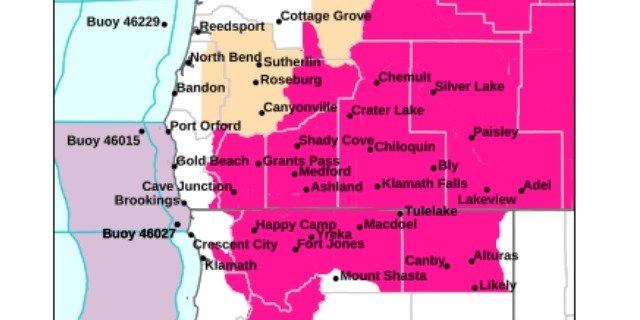Asante nurses, administrators in mediation, though ‘far apart’ on labor contract
Published 5:00 pm Tuesday, October 24, 2023

- On June 8-9, the National Labor Relations Board Subregion 36 ran two union-certification elections at Asante Rogue Regional Medical Center and counted the ballots in the evening June 9.
Nurses at Asante Rogue Regional Medical Center in Medford have entered the mediation stage of contract negotiations with hospital administration to address what they view as unsafe staffing levels, noncompetitive wages and inadequate benefits.
Trending
The Oregon Nurses Association, which represents the hospital’s frontline nurses, believes that talk of a strike is premature, but nothing is off the table, Kevin Mealy, an association spokesperson, said.
“They are far apart currently on an agreement,” Mealy said.
Lauren Van Sickle, Asante communications manager, said in a statement:
Trending
“Asante continues to bargain with Oregon Nurses Association representatives. Good progress has been made, and we look forward to furthering the process with the assistance of a federal mediator.
“The ONA has not provided Asante with a notice of intent to strike, and we believe both bargaining teams are committed to reaching an agreement,” she stated.
The nurses’ bargaining team has been negotiating with the hospital since early summer.
If progress stalls, or a last, best offer from either side is rejected, the nurses’ team could call a strike vote among union members. If this vote passed, it would authorize the nurses at the bargaining table to call a strike. If that were to happen, they would notify Asante 10 days in advance to give the hospital time to prepare or reach an agreement.
Mealy said that if Asante nurses take steps toward a strike, they would likely engage in public action, such as a march or informational picketing, to communicate their concerns with Rogue Regional.
The ONA represents more than 900 nurses at the hospital.
“Striking is always a last resort, especially for nurses who don’t want to leave their patients,” Mealy said. “They want to work, but they want work to be safe. They want it to be safe for themselves, they want it to be safe for their patients.”
When a strike occurs, hospitals may cancel surgeries, transfer patients or otherwise suspend services.
Jonathan Modie, lead communications officer at the Oregon Health Authority, said in an email that amid a strike, hospitals are required to meet federal and state health and safety requirements.
“Hospitals must have a plan in place to continue providing quality care during a strike,” Modie wrote. “During a strike, a health facility may cancel elective procedures to ensure adequate staffing for all non-elective care,” he wrote.
It will be Asante’s responsibility to communicate changes in services, he wrote.
The Rogue Valley has long faced significant health care shortages, including in nursing. The coronavirus pandemic further strained the region’s medical workforce and caused patients to postpone surgeries and otherwise delay seeking care, creating pent-up demand for services that providers must now see to.
A focus of negotiations has been nurses’ wages, which the ONA says should align with wages at comparable Oregon hospitals, such as St. Charles Bend. In a recent mediation, Asante pointed out that Bend’s cost of living is higher than Southern Oregon’s.
Pay increases are needed, the union argues, to recruit more nurses — Rogue Regional has a deficit of more than 300 — and eventually to staff the hospital’s new pavilion, which is scheduled to start taking patients in February.
“When you’re short nurses, you don’t have enough people to give patients the care they deserve,” Mealy said, “so people in the Rogue Valley can expect longer waits, worse care and bigger hospital bills.”
Last month, Asante nurses received text ads from Medical Solutions, a company based in Omaha, Nebraska, that helps connect travel nurses to health facilities. The ads — which were not necessarily aimed at Asante staff — indicated that a nurses strike loomed in Southern Oregon.
One ad said:
“Hello there! We are staffing a potential strike in Oregon for early October. Are you available/interested? Pay ranges from $7380-$8200 for currently Oregon licensed RNs.”
That’s a weekly wage, Mealy said.
Another ad said: “Housing will be provided- no stipends” and “We will pay for all transportation -flights, mileage if you drive, bus to hospital, etc.”
“Asante is trying to scare nurses into an agreement,” Mealy said in an email.
The nurses association argues that such strikebreaking measures are illegal in Oregon, citing two state statutes.
Oregon Revised Statute 662.215 says that no employer shall “(k)nowingly utilize any professional strikebreaker to replace an employee involved in a strike or lockout, for the duration of that strike or lockout.”
ORS 662.225 says: “No professional strikebreaker shall knowingly become employed or offer to become employed for the purpose of replacing an employee involved in a strike or lockout, for the duration of that strike or lockout.”
Van Sickle said in a statement: “We understand that complex legal concerns have been raised related to contingency planning in the event of a strike. First and foremost, Asante intends to continue to care for our patients and community if there were to be a strike.
“Asante also cares about complying with laws and regulations, and we are complying with applicable federal law, which governs all matters related to collective bargaining, including contingency planning (versus state law, which does not apply here).”
Last summer, the nurses association urged Oregon Attorney General Ellen Rosenblum to investigate Providence health system in Oregon for hiring strikebreaking nurses in June at facilities in Portland and Seaside, and for its home health services.
Providence responded that the statutes are unconstitutional, outdated and would have prevented the health system from caring for patients.
Roy Kaufmann, director of communications for Rosenblum’s office, said in an email that he had no updates on that front.








